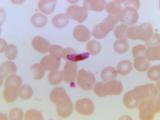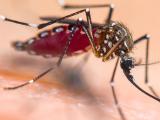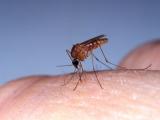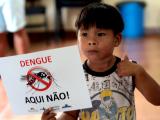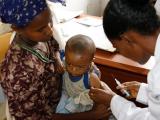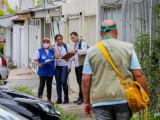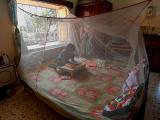Sep 11, 2012 (CIDRAP News) – A closely watched first clinical trial of a dengue vaccine showed disappointing efficacy results overall, researchers reported yesterday, but higher efficacy against certain strains.
The trial involved Sanofi's vaccine candidate, which is the furthest along of several dengue vaccines in development, and many observers had anticipated that the company could bring the vaccine to market as early as 2015. Currently, there is no vaccine against the disease, which is the leading cause of severe illness and death among children in some Asian and Latin American countries.
In a recent dengue strategy report, the World Health Organization (WHO) said the global incidence of dengue infections has risen 30-fold over the past 50 years, with more countries reporting outbreaks and the disease exacting growing tolls on populations and economies.
The study by researchers from France and Thailand appeared in The Lancet and reported only 30% overall vaccine efficacy. Sanofi's dengue vaccine candidate, called CYD-TDV, is a recombinant, live attenuated, quadrivalent vaccine based on the yellow fever 17D strain and is produced in Vero cells.
Compared with vaccines for other flaviviruses such as yellow fever and Japanese encephalitis, developing a dengue vaccine has been fraught with challenges, because the vaccine must target four serotypes that compete and interact at the immunologic level, according to the study. Also, the disease is unique to humans, which means researchers haven't been able to use animal models to test vaccine candidates.
The trial took place in school children ages 4 through 11 in a district of Thailand's Ratchaburi province, located about 62 miles west of Bangkok. The researchers selected the site because all four dengue virus serotypes circulate there, the region has adequate disease surveillance, and the people are highly aware of the disease.
Of 4,002 children included in the trial, 2,669 received the dengue vaccine and 1,333 got a placebo. They each received three doses and were immunized at 0, 6, and 12 months.
The team followed each participant for at least 13 months after the third dose. Researchers also documented all serious adverse events and assessed immune responses in the first 300 enrolled children before and 28 days after each dose. Dengue infections were confirmed by both reverse-transcriptase polymerase chain reaction and enzyme-linked immunosorbent assay.
During the study, researchers confirmed dengue infections in 134 children, and, of that group, 77 occurred more than 28 days after the third injection and were included in the study's primary analysis.
The scientists found that 45 occurred in the dengue vaccine group and 32 occurred in the control group, corresponding to a vaccine efficacy of 30.2% (95% confidence interval, -13.4 to 56.6), which was lower than what the researchers had projected based on their earlier immunogenicity studies. The difference between the groups was not significant.
Because the number of infections was higher than investigators expected, they were able to assess efficacy by dengue strain, and they found that efficacy was much higher against three of the four strains. After at least one injection, efficacy against dengue strains 1, 3, and 4 were 61.2%, 81.9%, and 90%, respectively.
Five severe dengue infections were reported, three in the vaccine group and two in the control group.
The team found little difference in adverse events between the two groups, with 12% of children in the vaccine group and 13% in the control group experiencing them. In total, 584 adverse events occurred. The group noted that the safety findings were good and consistent with previous trials using the same vaccine technology.
The researchers wrote that they were surprised that the vaccine wasn't effective against dengue strain 2, despite data that suggested satisfactory immunogenicity. They added that the finding will need further investigation, and they raised the possibility that there could have been an antigenic mismatch between the vaccine virus and the dengue 2 strain that caused disease in the study population.
A limitation of the trial is that it was conducted in one geographical area, the group wrote.
Phase 3 studies of the vaccine are under way in more than 30,000 subjects in 10 countries in Latin America and Asia, which will provide more information about its efficacy, the group wrote, adding, "Although the assumed high efficacy against all four serotypes was not shown, our study constitutes the first ever demonstration that a safe dengue vaccine is possible."
In an editorial on the study in the same issue of The Lancet, Scott Halstead, MD, senior scientific advisor for the Dengue Vaccine Institute, wrote that the low efficacy "comes as a complete surprise," given that phase 1 and 2 studies of dengue vaccines have typically produced excellent immunologic responses, which led to high hopes that the findings would translate to good vaccine efficacy.
He likened the disappointment over the dengue vaccine efficacy to those of low efficacies reported from early malaria and HIV vaccine clinical trials.
However, Halstead wrote that the findings aren't entirely unexpected, because dengue viruses are known for their antigenic complexity and their ability to evade immune elimination.
Given the partial efficacy findings, he wondered if a single-dose trivalent dengue vaccine would be useful in some prevention strategies.
The infections the group saw from dengue virus type 2 could relate to the antigenic mismatch that the authors suggested, or it might result from failure to obtain balanced viremia or immune responses when mixtures of the four dengue vaccines were given. "Serious deficits remain in our understanding of the mechanism or mechanisms by which human beings are protected against initial and successive infections with the four DENV [dengue viruses]," Halstead wrote.
Halstead pointed out that the number of children enrolled in the study wasn't large enough to gauge whether the vaccine was useful for preventing severe dengue infections, but he added that the large number of people enrolled in ongoing trials could help shed light on that issue.
Sabchareon A Wallace D, Sirivichayakul C, et al. Protective efficacy of the recombinant, live-attenuated CYD tetravalent dengue vaccine in Thai schoolchildren: a randomized, controlled phase 2b trial. Lancet 2012 Sep 11 [Abstract]
Halstead SB. Dengue vaccine development: a 75% solution? (Editorial) Lancet 2012 Sep 11 [Extract]
See also:
Sep 10 Lancet press release
Sep 4 CIDRAP News story "WHO takes aim at dengue in strategy document"
